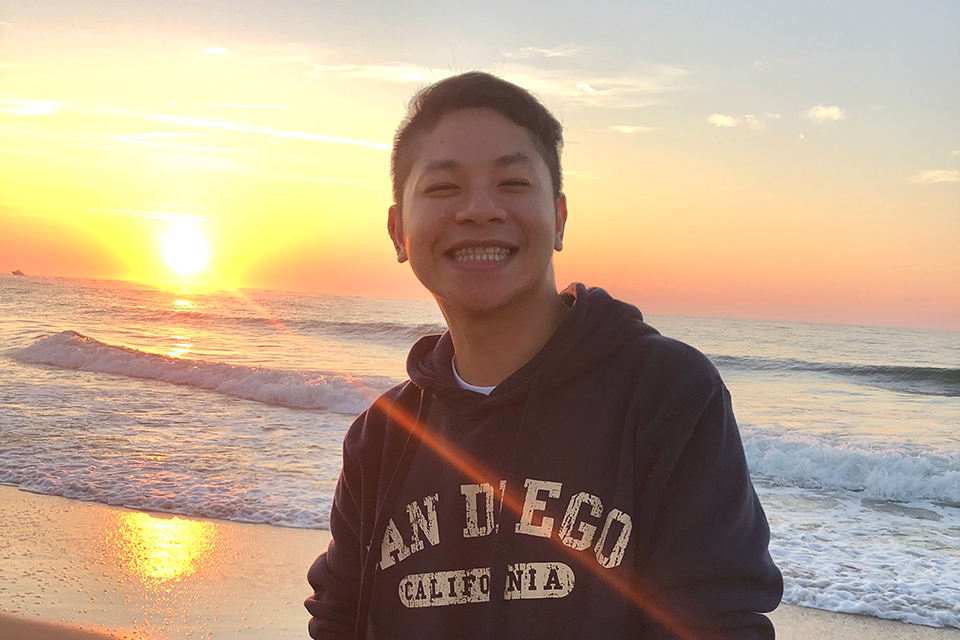“Life really does work out in the end…”
Written by: Minh Ta, fourth-year student pharmacist
This is an edited and condensed version of the personal story told by Minh (he/him) that appeared on dxqueer.com. View the original post to read Minh’s account of coming out and working as a queer person in health care.
Growing up as a first-generation American living in a conservative area, I didn’t personally know anyone in health care or anyone queer, let alone anyone queer in health care. My only exposure to queerness intersecting health care was through media like Grey’s Anatomy, Nip/Tuck, and House, but it still felt taboo back then.
I started questioning my sexuality around middle school, and coming out was really hard for me, but eventually it just became natural assimilating my sexual identity into who I am.
In pharmacy school, I’m still coming out to people. Honestly, I was a little nervous coming out to people in school. I know I shouldn’t be because they’re all generally liberal and open-minded. It’s really not that big of a deal, although I’m still nervous about it.
Now, I’d say I’m about 95% out, and the only people left are my parents. I even wear a pride flag pin on my white coat now.
In health care settings, I’ve seen queerness play out from both sides of clinician and patient. As a patient, I’m comfortable until I’m asked if I’m sexually active and if my partners are male or female. No matter how comfortable I am with my sexuality, part of me feels the need to hide my sexuality from my health care providers. It’s almost like a defense mechanism to me.
On an ambulatory care rotation in an outpatient transplant clinic, I saw a male patient who had a guest. When the patient introduced the other person as his partner, they both looked at my pride pin, and I vividly remember seeing them both relax after that small interaction. The rest of the check-up felt very casual, and they seemed to open up to me a lot. I never expected to make such an impact on people when I first put on the pride pin.
LGBTQ+ in Pharmacy Education
Because I’m in pharmacy school, there’s an emphasis on medication. In our endocrine module, there was a section on hormones for gender-affirmation and transitioning, but in the curriculum, that’s really the only exposure to the LGBTQ+ population that I can remember.
Recently on campus, they began a collaboration between the Schools of Pharmacy, Nursing, and Medicine to offer a week-long pilot course-study on providing interprofessional care for transgender pediatric and adolescent patients. I had the privilege of signing up for it, and it was a really great experience. We split into groups with at least one medical, nursing, and pharmacy student in each group. The professors brought in transgender adolescents to talk about their experiences in the health care system as a trans person and what they wished their providers did better, and offered insight on how we, as future providers, can improve care for trans people. It was a really rewarding experience, and I hope they continue to offer it in the future.
I have also been able to sit in on a continuing education information session about the controversies with gender hormone therapy, caring for transgender people, and insights and points of controversy in medication therapy. It was really interesting and reinforced education we learned in our other modules, including doses, drug target goals, and effects in gender affirming hormone therapy. It also delved into more nuanced topics, such as a study which supported subcutaneous testosterone injections compared to intramuscular.
I think pharmacists are one of, if not the most, accessible health care provider. There’s a CVS, Walgreens, or grocery store pharmacy everywhere. If there’s one thing that the COVID-19 pandemic taught us, it’s that community and retail pharmacists especially are an integral yet undervalued part of health care. I think that, should they choose to, these pharmacists could play the biggest role in improving and advocating for LGBTQ+ health care.
As more and more queer people enter health care, and we keep advocating for things like including pronouns on hospital pins and badges, we can make health care more comfortable for the LGBTQ+ community. For the non-queer providers reading, keep supporting us. Just having your pronouns visible helps show that you are an ally.
Personally, I feel like some members of the LGBTQ+ community may have mistrust in the medical community. I hope that we, as future queer providers, can do something to close that gap.

